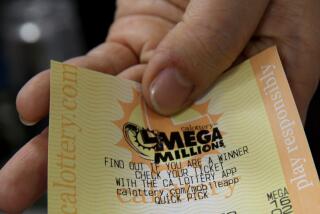N.Y. Transit Fares Raised to Cut Deficit
- Share via
NEW YORK — After strong opposition from more than 50 speakers, the city’s transit agency voted Thursday to raise subway and bus fares by 50 cents, to $2 a ride -- the first increase in New York in more than seven years.
The decision, which affects more than 7 million daily travelers, was a foregone conclusion in the crisis atmosphere of city and state budget deficits.
The Metropolitan Transportation Authority board also approved an increase in the tolls at some bridges and tunnels.
Shouts of “Shame on you” rang out in the meeting room at MTA headquarters in Manhattan when the unanimous vote was announced.
MTA Chairman Peter S. Kalikow said the increase was necessary to avoid service cuts or layoffs. “We had a budget deficit that we needed to fill,” he said.
“From a national perspective, New York will have the highest base transit fare in the nation. Riders now will pay 65% of the cost of operating the system,” countered Gene Russianoff, a lawyer for the Straphangers Campaign, a public interest group that protested the fare increase.
Citing federal figures, Russianoff said the average percentage of transit costs paid by riders nationwide is 40%, and 32% in Los Angeles. “It’s unfair,” he said.
Russianoff and several public officials have contended that financial data released by the Metropolitan Transportation Authority lack sufficient evidence to justify a raise, and the precise dimension of the agency’s deficit is difficult to calculate.
They accuse the MTA of juggling numbers for political purposes, noting that in 2002, the MTA estimated its deficit at $663 million for the coming year while it was selling $13.9 billion in bonds. Shortly after Gov. George E. Pataki easily won reelection in November, the deficit was increased to $2.8 billion.
The latest calculation of $952 million comes from New York City’s Independent Budget Office, which reviewed the MTA’s public filings.
“They low-balled the number when they wanted to help the governor during the election season, and they raised it through the roof when they asked for a $2 fare in order to scare people,” Russianoff said.
In 1995, when the MTA raised the fare 25 cents, to $1.50, Mayor Rudolph W. Giuliani vigorously attacked the agency, contending that it was badly managed. This time, there was no outcry from Mayor Michael R. Bloomberg, who has been seeking an expanded subway line in Manhattan and other concessions from the transportation authority.
“The sad reality is that we have a slowdown, the tax revenues aren’t there,” Bloomberg said. “We need the services, and we’re just going to have to pay for them.
“There’s clearly going to be some people hurt. It’s very sad. But that is going to happen. What I have to focus on is trying to help as many people as I can.”
All four of the mayor’s nominees to the board voted for the increase, which will become effective in May.
Among the elected officials opposing the fare increase and higher bridge and tunnel tolls was Brooklyn Borough President Marty Markowitz.
“As you’ve heard again and again, New Yorkers are outraged,” Markowitz told the board before the vote. “It makes absolutely no sense to even consider a fare increase.”
On a gray and cold day when snow fell in New York, few subway riders hurrying along streets to stations were willing to stop and discuss the higher fare.
Typical was the reaction of a woman who declined to give her name as she rushed down the stairs at an entrance on 33rd Street.
“We’ve got no choice. We’ve got to pay it,” she said.
*
Times researcher Lynette Ferdinand contributed to this report.
More to Read
Sign up for Essential California
The most important California stories and recommendations in your inbox every morning.
You may occasionally receive promotional content from the Los Angeles Times.










